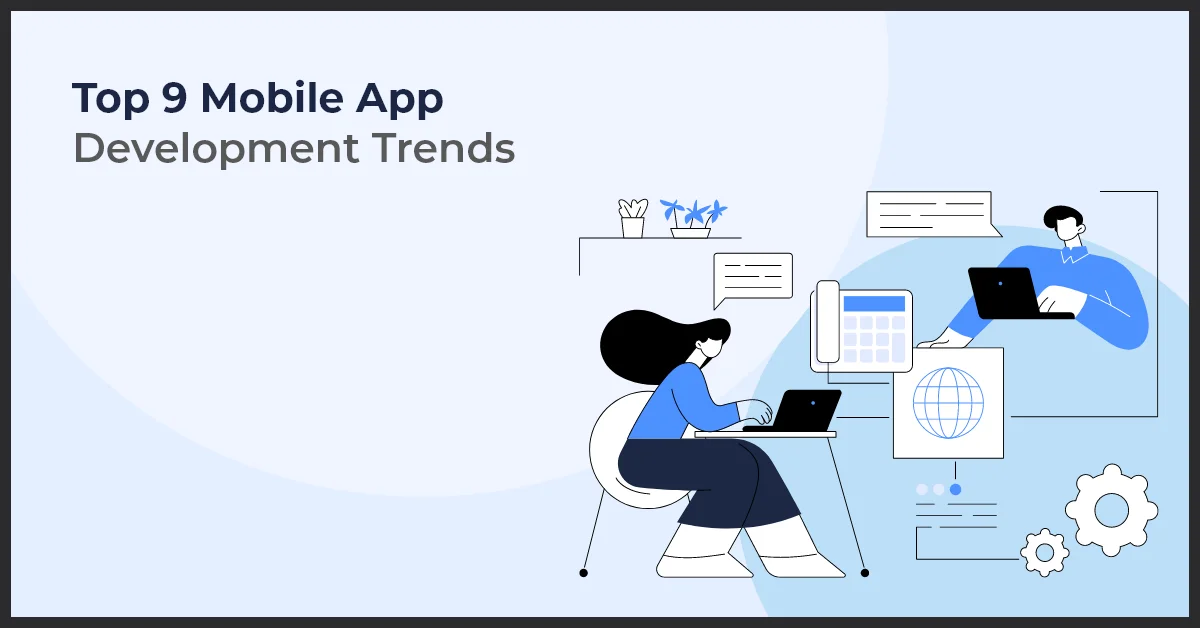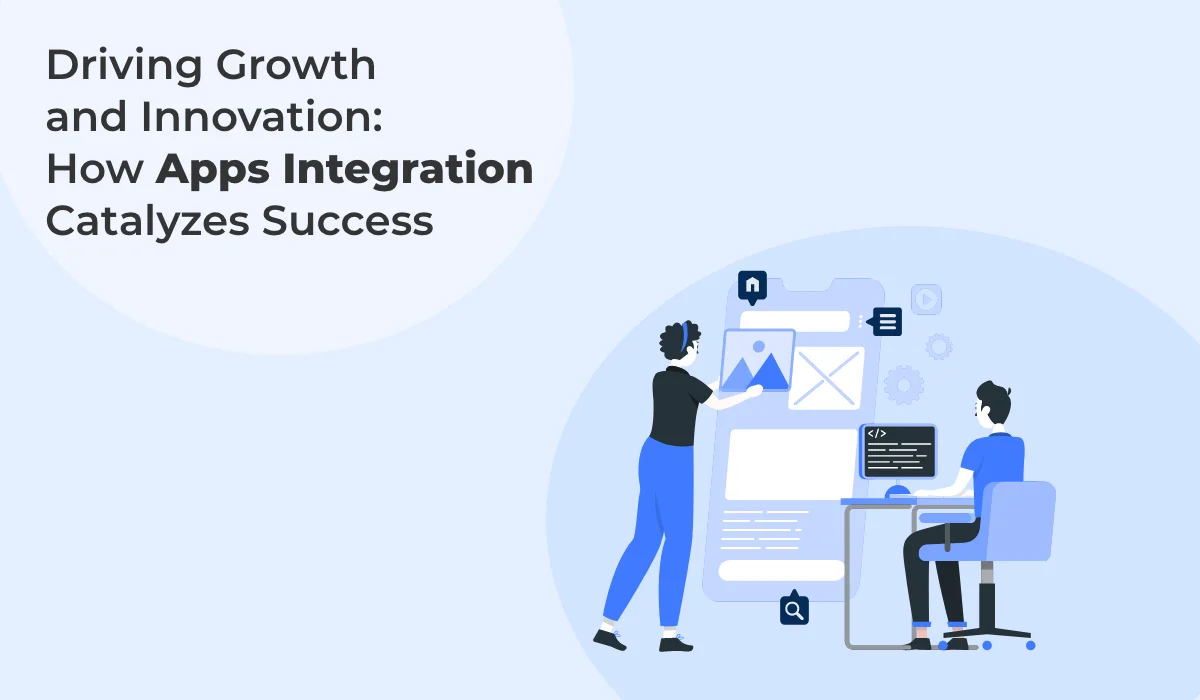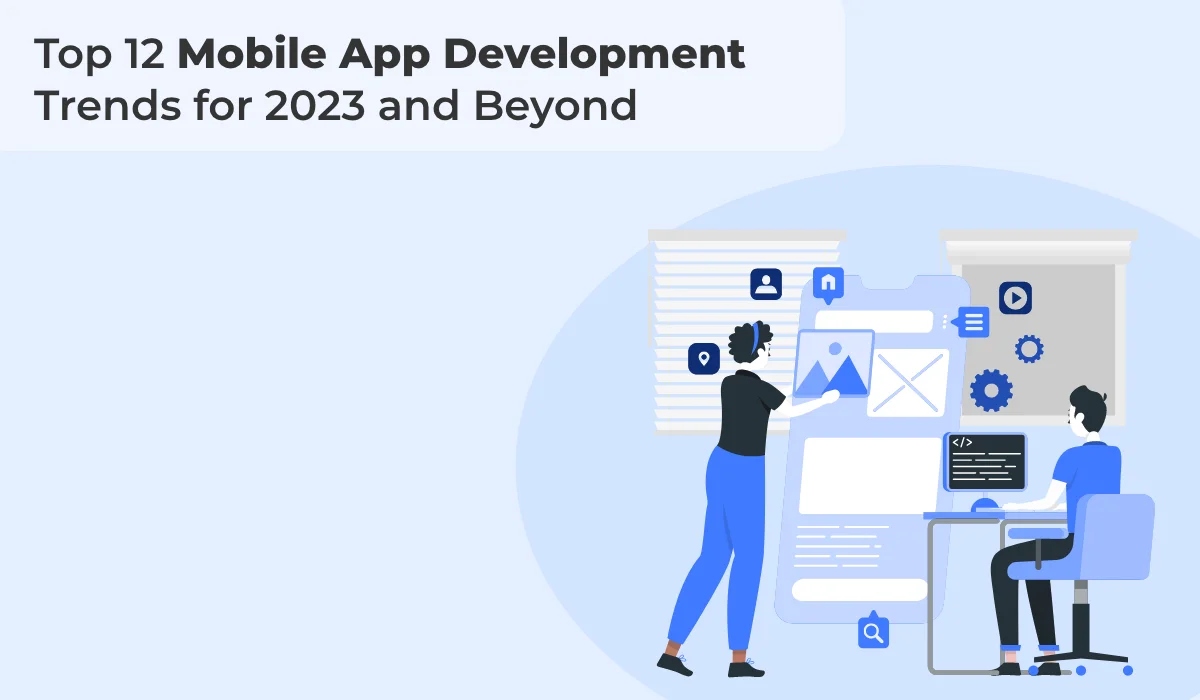Top 9 Mobile App Development Trends

Published on: January 29, 2022
Updated on: September 04, 2024
2638 Views
- App Development
11 min read
In the third quarter of 2022, Android users were provided with a wide selection of 3.55 million apps, establishing Google Play as the app store with the highest number of available apps. On the other hand, the Apple App Store, catering to iOS users, offered approximately 1.64 million apps, securing its position as the second-largest app store.
What does it imply?
The mobile app development industry has become a playground for various approaches and methods. Thousands of apps get developed every year, but only a handful actually succeed in making some serious money.
Have you wondered why?
The reason is quite obvious, apps that follow old-school development practices don't survive long in the market because the cutting-edge digital world demands an app that can keep up with the recent trends.
To drive growth and innovation, it is crucial to leverage the power of app integration, as it acts as a catalyst for success. By seamlessly integrating various applications, businesses can enhance their users' experience, ensuring great-looking apps, fast load times, and snappy response times.
Staying updated with the latest technology, user behavior, and market trends, including the evolving nature of app integration, is essential to meet the ever-changing demands of users and remain competitive in the market.
This blog post will give you insights into the future of this ever-growing technology, unveiling how this industry has evolved over time and how it keeps on reinventing itself as we speak.
Top Mobile App Development Trends
To ensure the success of your app, it is important to focus on driving growth and innovation through seamless integration. By effectively integrating various applications, you can enhance the user experience and achieve great-looking apps, fast load times, and snappy response times.
1. 5G Technology
5G Technology Market size was valued at USD 68.91 Billion in 2024 and is projected to reach USD 4526.79 Billion by 2031, growing at a CAGR of 91.56% from 2024 to 2031.
While 4G was designed to allow information to be shared at higher speeds than 3G, moving forward, 5G will lead to an entirely new set of technological possibilities across every sector.
5G networks focus on the upcoming technology that provides the opportunity to develop innovative applications and services with a high level of network efficiency, traffic, and data capacity. Also, allowing them to develop innovative applications and services, while also enhancing marketing automation capabilities for more personalized and real-time customer interactions. This indicates significant opportunities for companies to improve their businesses and create new ones.
In addition to the integration of 5G networks, understanding Google Analytics is crucial for companies aiming to implement an effective marketing strategy, as it provides valuable insights and data-driven metrics that can inform decision-making, optimize campaigns, and enhance overall marketing performance.
5G technology continues to advance, and its impact on mobile app development is even more significant. The widespread availability of 5G networks has opened up opportunities for developers to create innovative applications with faster speeds, lower latency, and higher bandwidth.
Currently, several giant tech firms are mobilizing the technology, and leading service providers are developing it.
2. Beacon Technology
Many people are familiar with beacon technology, and a variety of businesses, including healthcare, eCommerce, museums, and hotels, have been utilizing it. However, it is not often employed in mobile app development. It has been gaining popularity in the mobile business for a few years, and it appears to be on the rise in the coming years as well.
Furthermore, by leveraging beacon technology, businesses can bridge the gap between the online and offline worlds, connecting customers' digital experiences with their physical interactions.
With insights gained from understanding how customers engage with mobile apps and integrating them with CRM technologies, businesses have the opportunity to create seamless and personalized experiences that cater to their customers' needs across various devices and applications.
The common mobile beacon technology to witness are AI-enabled chips, mobile payments beacons, and AI and ML automated implications. The technology is used to track user behavior, detecting the total time a customer spends viewing a product or service.
Beacon technology continues to evolve and find applications in various industries. With advancements in Bluetooth technology and increased adoption, mobile app developers are leveraging beacons to enhance user experiences through personalized notifications, location-based services, and improved customer engagement.
3. Augmented Reality/Virtual Reality (AR/VR)
In 2022, the worldwide market for extended reality (XR), which includes augmented reality (AR), virtual reality (VR), and mixed reality (MR), recorded a value of US$ 29.26 billion. It is projected that this market will witness substantial growth, exceeding US$ 100 billion by 2026.
Augmented reality (AR) and virtual reality (VR) have been around for a longer time than you know, albeit in a more basic form. Computer-generated images, given the look and feel of reality, were used to create realistic backgrounds for film scenes, video games, and even educational programs.
However, ever since smartphones got bundled with cameras and powerful computer chips, AR/VR started making waves as a popular interactive app experience. Apple, Google, and Meta are all bringing AR and VR technologies to the market. In Google Maps, Google included a feature called "Live View," which allows users to view the direction in real-time on real-world photos.
Additionally, AI-powered solutions like Pardot Einstein in Salesforce are revolutionizing B2B marketing automation and optimizing customer communication. These advancements highlight the ongoing evolution and relevance of technology in the mobile app development industry.
Leveraging Salesforce Account Management's best practices allows businesses to optimize customer relationships and improve overall account management strategies.
Augmented reality and virtual reality continue to gain traction in the mobile app development industry. The advancements in AR/VR technologies, along with the integration of hardware like smart glasses and headsets, have opened up new possibilities for creating immersive and engaging experiences in mobile applications.
Industries such as gaming, entertainment, retail, and education are incorporating AR/VR to enhance user interactions and offer unique experiences.
4. Artificial Intelligence and Machine Learning
Artificial intelligence (AI) and machine learning have profoundly changed the IT sector, particularly mobile applications, taking it to new heights.
Artificial intelligence and Machine Learning
Delivering customized user experiences through a mobile app is difficult. Creating an attractive app design and engaging content is not enough. Using an artificial intelligence-enabled analytics solution pivots the way businesses provide value to users by knowing how, when, where, and why they interact with a mobile app. Predictive analytics and machine learning algorithms are two key technologies that can support personalized mobile experiences for applications.
In the realm of mobile app development trends, incorporating AI techniques allows for the creation of new services that enhance user interface (UI) and user experience (UX). These advancements empower users to navigate apps more seamlessly, interact with their devices effortlessly and efficiently, address challenges posed by complex interfaces, and explore novel input modes for a more intuitive and engaging app interaction.
AI and ML continue to play a crucial role in mobile app development. Developers are integrating AI-powered chatbots, voice assistants, recommendation engines, and predictive analytics into mobile apps to enhance user engagement, personalize experiences, and automate tasks.
AI and machine learning technologies are enabling apps to understand user behavior, make intelligent recommendations, and provide real-time insights, making the user experience more seamless and intuitive.
5. Mobile Commerce
Mobile commerce is a critical element to watch out for, and no list of mobile app trends can be completed without addressing them. It is a trend that will bring about a shift in mobile app solutions in the upcoming years, as it has been prospering since 2020.
For mobile app resellers, mobile commerce capabilities are a must-have feature when pitching clients. It is anticipated that mCommerce sales will surpass $510 billion and increase to $710 billion by the end of the decade.
Mobile commerce continues to dominate the app development landscape. With the increasing use of smartphones for online shopping, developers are focusing on creating seamless and secure mobile commerce experiences.
Integrating features like mobile payments, digital wallets, personalized recommendations, and one-click purchasing has become essential for mobile apps to thrive in the competitive e-commerce market.
6. Cloud-Based Applications
Every organization seeks efficient infrastructure and hybrid solutions. Although cloud computing integration is not new, it has yet to attain its full potential.
Instead of keeping information on the user's smart devices, apps may store data and perform complicated operations. As a result, you can have increased space and enhanced convenience, henceforth saving money and time for development operations.
Cloud-based applications continue to gain popularity in the mobile app development industry. The use of cloud infrastructure allows developers to create scalable, secure, and accessible applications.
With cloud-based storage, developers can store app data, enable real-time synchronization across devices, and leverage cloud computing power for complex operations and data processing.
7. Mobile Wallet
PayPal, Venmo, Google Pay, Apple Pay, and Samsung Pay – ring a bell? All of these are examples of mobile wallets. A virtual wallet created to make your life easy, without engaging in the trouble to carry around wallets or credit cards.
Moreover, with the present scenario, contactless payments is a need, and mobile wallets play a huge role in making these attempts successful.
Mobile wallets have become even more prominent in the mobile app landscape. With the increasing adoption of contactless payments and the rise of cryptocurrencies, mobile wallets have evolved to support a wide range of payment options and secure transactions. Developers are integrating mobile wallet functionality into apps, enabling users to make purchases, transfer funds, and manage their finances conveniently from their mobile devices.
8. Blockchain
As of June 2023, the global user base of the Bitcoin block explorer blockchain.com wallet has exceeded 85 million. Moreover, on a daily basis, approximately 405,376.125 Bitcoin transactions are conducted, indicating the widespread usage of Bitcoin.
Blockchain caught our eyes because of cryptocurrencies. Certainly, it is best known as the technology behind Bitcoin. In fact, it's a lot more than that and blockchain development is one of the biggest changes in the financial system since the internet was created in the early 1990s.
In addition to the emerging trends in mobile app development, Digital Experience Platforms (DXPs) are gaining prominence. These platforms enable the integration of currency converters leveraging blockchain technology for secure storage of digital assets, maintaining digital identities, and managing loyalty programs.
Furthermore, intelligent contracts, anti-piracy software, election control tools, and Blockchain as a Service (BaaS) platforms are anticipated to witness increased adoption, further shaping the landscape of mobile app development.
Blockchain technology continues to disrupt various industries, including mobile app development. Developers are leveraging blockchain for secure data storage, decentralized applications (DApps), smart contracts, and enhancing transparency and security in mobile apps. The integration of blockchain technology enables trust, immutability, and enhanced data privacy in mobile applications.
9. Foldable Phones
Not all, but at least some of us have had the pleasure of using flip phones back in the time launched by Motorola. The smartphone revolution took over the essence of these flip phones brought to the table.
But certainly, these foldable gadgets have taken over the market yet again, with mobile phones switching from touch displays to GPS functionality and only one or no buttons.
When it comes to innovation, foldable gadgets have made a comeback in the mobile industry. The idea is that an app should be adaptable and change its presentation fluidly when the screen folds or unfolds.
Foldable phones continue to shape the mobile app development landscape. Developers are designing apps to adapt to the unique form factors of foldable devices, providing seamless user experiences as the screens fold and unfold. Apps can take advantage of the extended screen real estate when unfolded, offering enhanced multitasking, immersive content, and new interaction possibilities.
Final Thoughts
The mobile app development trends mentioned above offer valuable insights into the trends that continue to shape the industry. By staying abreast of these trends, you can position yourself for success and be prepared for the exciting developments that lie ahead.
Growth Natives can help you build mobile apps based on these upcoming marketing trends with ease and expertise. Connect with our experts at info@growthnatives.com or visit us here.



